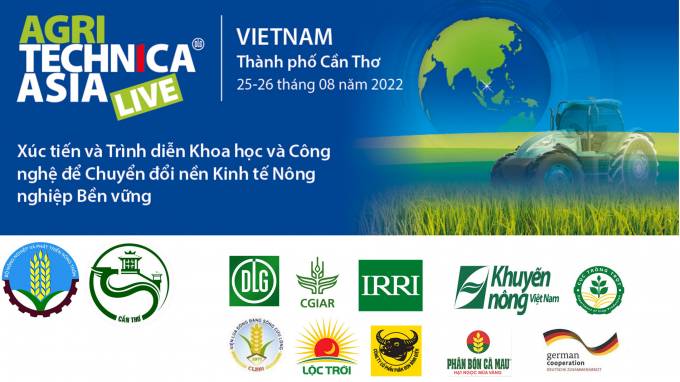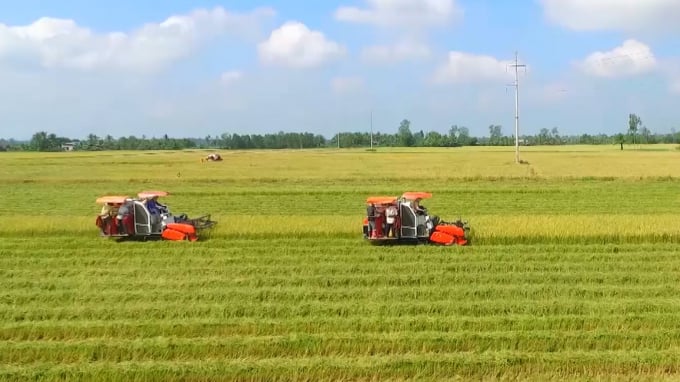May 24, 2025 | 16:26 GMT +7
May 24, 2025 | 16:26 GMT +7
Hotline: 0913.378.918
May 24, 2025 | 16:26 GMT +7
Hotline: 0913.378.918

The first international program on agricultural mechanization is slated to hold in Can Tho city.
Can Tho is slated to hold the international mega-event "AGRITECHNICA Live 2022" focused on new machinery and technical equipment in agricultural production.
The Ministry of Agriculture and Rural Development of Vietnam, the German Agricultural Society, and the International Rice Research Institute (IRRI) are co-organizing the event, which is themed "Building value chains in mechanizing agricultural production synchronization" with many related topics.
The spotlight of the "AGRITECHNICA Live 2022" event is the live exhibition of innovative technology and equipment that are tested in the field enabling farmers, cooperatives, and companies to jointly monitor and assess their efficacy.
The event exhibition seeks to promote sustainable mechanization by showcasing the application of cutting-edge technology in indigenous production systems. It is projected to draw between 3,000 and 4,000 participants from Vietnam and overseas, including farmers, machinery owners, service providers, scientists, and merchants.
Ms. Katharina Staske, Director of the German Agricultural Society (DLG) Asia in Thailand, one of the event's organizers, stated that "this is a notable shift from the German Agricultural Society's previous activities in other countries such as Thailand."
Additionally, "AGRITECHNICA Live 2022" will feature a series of activities, including live demonstrations of good practice models for rice production on the field, such as the sustainable rice production model SRP, which has over 100 members representing the world's largest international rice traders; advanced production efficiency, including efficiency in the use of agricultural materials, land, and water; and a sustainable straw management model. Demonstrating and displaying technologies, machinery, and equipment for modern and sustainable agricultural production.
The Mekong Delta is regarded as the agricultural heartland, with rice, seafood, and fruits serving as the primary commodities. Mechanization approaches in agriculture are entirely suited in today's fiercely competitive market economy.
Since 2010, the National Agricultural Extension Center has hosted combined harvester contests to encourage complete automation of harvesting activities in the Mekong Delta. Since 2016, following the straw rolling event, machines have rolled up to 10%-20% of the straw gathered in the area. A range of innovative technical devices, such as laser leveling of fields, accurate sowing, drones, and an application that controls rice farming data, are being used as a demonstration model and subsequently extensively used throughout the region to promote rice production.
From a practical perspective, Mekong Delta farmers have long invested significantly in agricultural technology, but efficiency has been limited; one of the reasons cited by the agricultural business is a lack of synchronization.

Mekong Delta farmers apply mechanization in rice harvesting.
During the discussion on the organization plan for the "AGRITECHNICA Live 2022" event, MARD Deputy Minister Tran Thanh Nam emphasized: "Mechanization must be executed synchronously to build a value chain that boosts agricultural output productivity while decreasing costs. It must, above all, help to enhance the value of reused byproducts. Rice post-harvest loss was around 13% in the past; it has now fallen to 10%, but when compared to 5% of the world's rice, this percentage remains significant."
Mr. Huynh Van Thon – Chairman of the Loc Troi Group, who shares the same opinion, flatly stated that asynchronous mechanization will result in farmer losses. Today, farmers in the Mekong Delta achieve a high rate of mechanization, but there is no synchronization. "Synchronization of mechanization must be defined via the management and reorganization of production, transportation, irrigation, processing, consuming, and logistics networks," Mr. Thon stated. Farmers have implemented mechanization in the past, but development has stalled as equipment becomes outdated, resulting in a decline inefficiency."
To maximize the role of mechanization, Deputy Minister Tran Thanh Nam stated that the Ministry of Agriculture and Rural Development has advised the Government to issue a Decree directing the implementation of synchronous mechanization in agricultural production. In particular, the Mekong Delta needs a mechanization center that will bring together mechanized businesses and serve three primary functions: farmer training in mechanization; research and transfer of mechanization; and the center will serve as a place to both start-up mechanization and incubate creativity.
The Deputy Minister anticipated that the "AGRITECHNICA Live 2022" event, which takes place in August, will leave an imprint on farmers, altering their attitudes toward mechanization in the agriculture field with the goal of increasing productivity and product value.
Translated by Linh Linh

(VAN) In the tranquil wetlands of Van Long, there are quiet souls who guard the forests, nurture the waters, and oversee every bird and troop of langurs as protecting the essence of a living heritage.

(VAN) WWF, GIZ, IUCN, UNDP call for biodiversity conservation and sustainable development must be regarded as a unity in strategies for a green future.

(VAN) On celebration of International Day for Biological Diversity, Deputy Minister Nguyen Quoc Tri called for practical actions to address nature and biodiversity conservation.

(VAN) Dr. Hoang Thi Thanh Nhan – Deputy Director of the Nature and Biodiversity Conservation Agency – highlighted this on the International Day for Biological Diversity, May 22, 2025.
![Ho Chi Minh city adapts to climate change: [2] Accelerating action](https://t.ex-cdn.com/nongnghiepmoitruong.vn/608w/files/chiqk/2025/05/22/4024-4220-bien-doi-khi-hau-1-100626_766.jpg)
(VAN) Clearly recognizing the challenges posed by climate change, Ho Chi Minh city has swiftly shaped its policies and implemented practical solutions to adapt.

(VAN) Rice straw is no longer just a discarded byproduct, but it is becoming a green resource that helps farmers in the Mekong Delta reduce emissions and promote circular, sustainable agriculture.

(VAN) Other Effective Area-based Conservation Measures (OECMs) are solutions that contribute effectively to achieving the goals of the Kunming–Montreal Global Biodiversity Framework.